ການໃຈ້ແຍກໂດຍ "ປັບປຸງ"
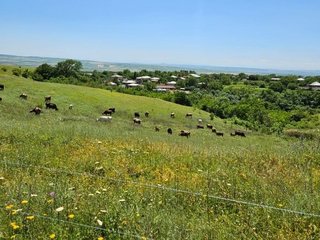
Controlled Grazing [Georgia]
“Controlled Grazing” seeks to harness the behaviours and habits of ruminant livestock to enhance three key ecological functions, namely the removal of plant biomass (grazing), soil and vegetation disturbance (animal impact) and increased nutrient cycling (dung and urine), with the goal of increasing perennial grass establishment, pasture palatability and reducing bare ground and erosion.
- ຜູ້ສັງລວມຂໍ້ມູນ:
- Nicholas Euan Sharpe
- ການສ້າງ:
- 2025-06-26 10:29
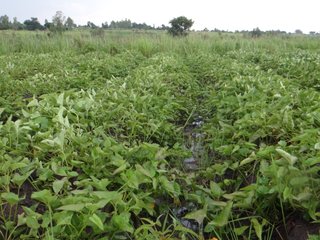
Potatoes Growing in Lowlands for Food Security Durnig Dry Seasons [Uganda]
Lowlands have relatively high water tables and contain sufficient soil moisture to permit potatoes growing. Potatoes can grow in such areas compared to other staple crops like cassava.
- ຜູ້ສັງລວມຂໍ້ມູນ:
- Bernard Fungo
- First published:
- 2020-05-14 17:04
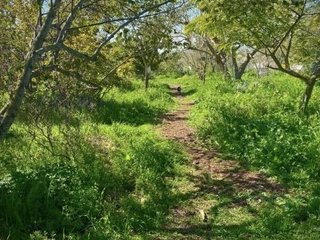
Conversion of conventional monoculture farmland into a food forest [Israel]
Converting conventional monoculture farmland into a food forest-based agroforestry system restores soil health, increases vegetation cover, enhances biodiversity while diversifying production. The intervention improves soil organic matter and ecological resilience through multi-storey planting, reduced soil disturbance, and nature-based land management.
- ຜູ້ສັງລວມຂໍ້ມູນ:
- Tom Cohen
- First published:
- 2025-11-12 07:46
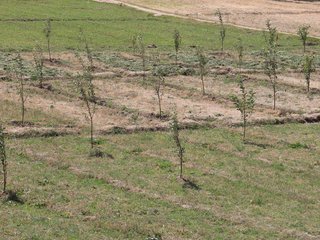
Agroforestry to improve soil fertility, water retention, and sustainable income for local communities [Afghanistan]
The Agroforestry system in Malistan district combines traditional practices with support from the Community-Based Sustainable Land and Forest Management project in Afghanistan. This initiative provides technical support, training, and resources like apple trees, fertilizers, and alfalfa seeds to establish 400 orchards (1,000 m² each). The goal is to enhance community livelihoods by reducing dependence on rangelands, helping to preserve local ecosystems.
- ຜູ້ສັງລວມຂໍ້ມູນ:
- Ahmad Zia Jalalzai
- First published:
- 2025-11-04 09:08
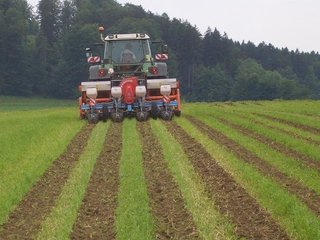
Maize strip tillage [Switzerland]
A cropping system for maize which reduces the reworking of the soil to the stripes, in which the seeds are planted.
- ຜູ້ສັງລວມຂໍ້ມູນ:
- Roman Wyler
- First published:
- 2017-03-09 14:31
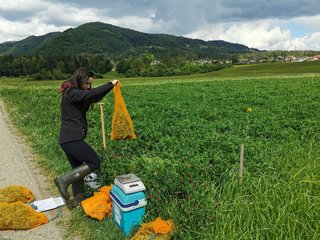
Crimson clover as an overwintering cover crop for nitrogen supply [Slovenia]
Crimson clover, overwintered as a cover crop, forms a symbiotic relationship with nitrogen-fixing bacteria, capturing nitrogen and thus enriching the soil. This helps reduce the need for synthetic fertilizers and aids in soil erosion control, weed suppression, and improved soil structure.
- ຜູ້ສັງລວມຂໍ້ມູນ:
- Tamara Korošec
- ການສ້າງ:
- 2025-03-19 12:14
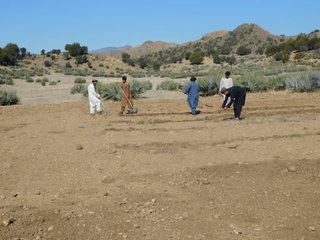
Learning Site to promote Sustainable Land and Forest Management Practices in Khost [Afghanistan]
The learning site incorporates several key elements of the technology including a solar-powered water lifting system, three reservoirs and an adopted irrigation system. It features demonstration plots for various initiatives, such as tree planting (walnut, almond, pomegranate and mulberry, the cultivation of fodder (alfalfal Mazari palm) and and medicinal plants (e,g, cumin), and a nursery (walnut) established through the community’s own contributions.
- ຜູ້ສັງລວມຂໍ້ມູນ:
- Mohammad Arif
- First published:
- 2025-10-17 14:46
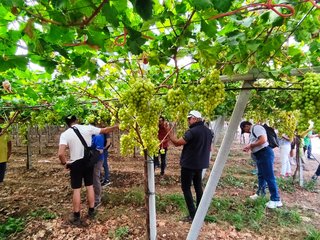
Organic Farming of Table Grapes [Italy]
Organic Farming (OF) of table grape production in Apulia region is estimated at 8.5% of the total area. The advantages of OF include an increase in soil organic matter, better water holding capacity and lower soil salinity.
- ຜູ້ສັງລວມຂໍ້ມູນ:
- Pandi Zdruli
- First published:
- 2025-10-16 13:56
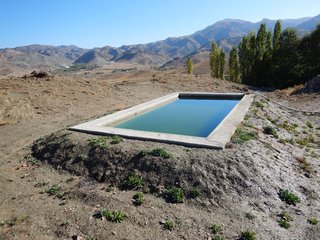
Gravity Irrigation for enhancing Community-Based Restoration efforts in the degraded forests of Paktya [Afghanistan]
Using a gravity-irrigation system, spring water is diverted to fill reservoirs and then distributed to fields for the restoration of degraded forest areas, with the active involvement of local communities and a focus on the sustainable use of water resources (spring water).
- ຜູ້ສັງລວມຂໍ້ມູນ:
- Mohammad Wazir Ahmadzai
- First published:
- 2025-10-17 14:46
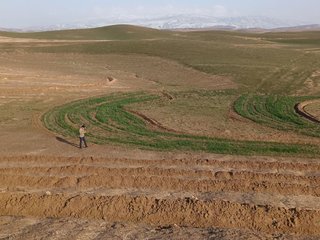
Contour trenches and contour strips [Uzbekistan]
Contour trenches for the cultivation of almond trees, and contour strips for cereals are types of rainwater harvesting structures. They are designed to capture runoff, reduce erosion, and enhance soil moisture—thereby improving land productivity and supporting climate-resilient agriculture in lowland dry areas.
- ຜູ້ສັງລວມຂໍ້ມູນ:
- Joren Verbist
- First published:
- 2025-07-09 17:31
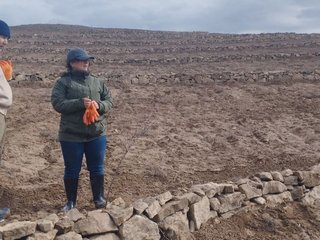
Gradoni Orchard Terraces [Uzbekistan]
Gradoni orchard terraces are intermittent strips of contour-based structures separated by catchments of about 10 metres. They are designed to capture and hold rainwater, reduce erosion, and improve conditions for the cultivation (in this case) of almond and pistachio trees, thereby enhancing land productivity and climate resilience in dryland areas.
- ຜູ້ສັງລວມຂໍ້ມູນ:
- Joren Verbist
- First published:
- 2025-07-09 17:31
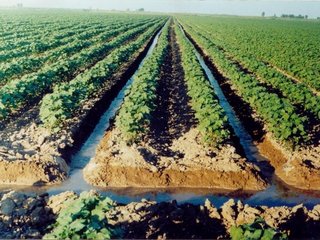
Water-conservation technology at cultivation of the cotton in south. K [Kazakhstan]
The technology of watering through furrow reduces the settlement (recommended) sizes of irrigating norms up to 30% keeps soil fertility
- ຜູ້ສັງລວມຂໍ້ມູນ:
- Unknown User
- First published:
- 2017-05-26 11:32
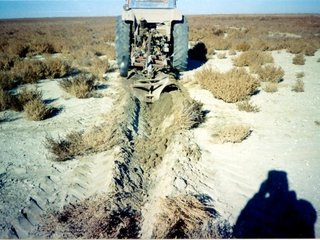
Technology of fastening Aral sea's drained bottom' s soil [Kazakhstan]
Technology of fastening Aral Sea's drained bottom's soil
- ຜູ້ສັງລວມຂໍ້ມູນ:
- Vladimir Kaverin
- First published:
- 2017-05-25 17:10
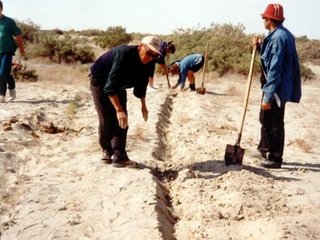
creation of meliorative plantings for struggle with erosion [Kazakhstan]
Technology of creation of meliorative plantings for struggle against wind and water erosion
- ຜູ້ສັງລວມຂໍ້ມູນ:
- Vladimir Kaverin
- First published:
- 2017-06-01 15:14
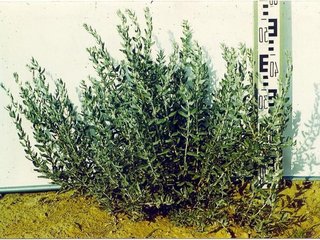
Creation of artificial pasturable phytocenosis at north desert subzone [Kazakhstan]
Selection fodder plants and the technology of their cultivation for maximal use of poor soil water in desert
- ຜູ້ສັງລວມຂໍ້ມູນ:
- Unknown User
- First published:
- 2017-05-26 13:50
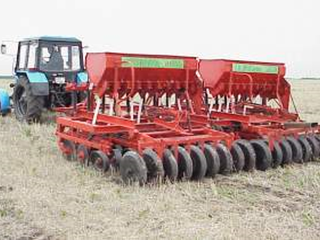
Conservation Agriculture for cereal production in rainfed areas of Kazakhstan [Kazakhstan]
Conservation agriculture applied in Northern Kazakhstan is based on no-tillage direct sowing of cereals into the soil permanently covered by crop residues. It contributes to reverse soil degradation, enhance water use efficiency, increase crop productivity in the rainfed lands.
- ຜູ້ສັງລວມຂໍ້ມູນ:
- Kulyash Iskandarova
- First published:
- 2020-03-09 14:59
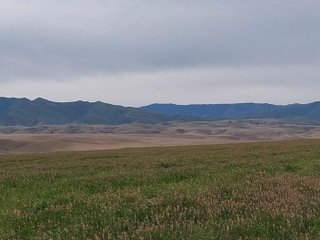
Creation of sown cultural pastures for summer-autumn use in the conditions of the foothill zone of south-eastern Kazakhstan [Kazakhstan]
Creation of cultivated pastures for summer-autumn use with sowing of perennial drought-resistant forage crops (sainfoin under barley cover - for summer use, izen - for autumn use) in the conditions of the foothill zone of south-eastern Kazakhstan
- ຜູ້ສັງລວມຂໍ້ມູນ:
- Kulyash Iskandarova
- First published:
- 2023-07-12 17:05
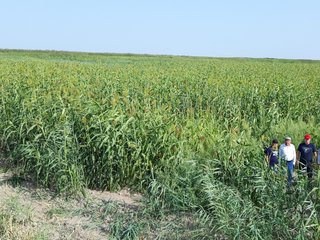
Introduction of sweet sorghum into rice crop rotations to restore degraded saline lands and diversify agricultural production [Kazakhstan]
The introduction of sweet sorghum into rice crop rotations is one of the approaches to restoring degraded lands under conditions of irrigation water scarcity and secondary soil salinization, while also diversifying agricultural production in local communities through the development of a stable fodder base for livestock husbandry.
- ຜູ້ສັງລວມຂໍ້ມູນ:
- Kulyash Iskandarova
- First published:
- 2023-03-29 09:08
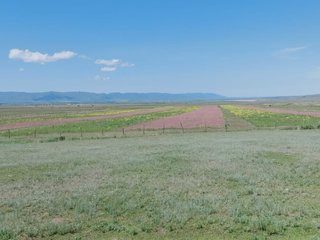
Fundamental Improvement of Low-Productivity Pastures through Strip Planting of Perennial Drought-Resistant Grasses in the Foothill Semi-Desert Zone of Southeastern Kazakhstan [Kazakhstan]
Radical improvement of low-yield pastures by strip placement of perennial drought-resistant grasses in the conditions of the foothill-semi-desert zone of south-eastern Kazakhstan
- ຜູ້ສັງລວມຂໍ້ມູນ:
- Kulyash Iskandarova
- First published:
- 2023-02-24 12:17
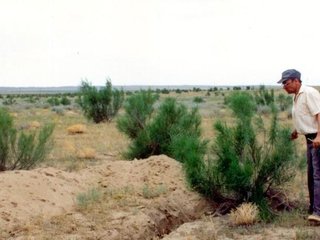
Creation of haloxylon pasture-protective strips at north desert [Kazakhstan]
Localization of erosion processes and moisture accumulation by creation haloxylon strips in pastures of north desert
- ຜູ້ສັງລວມຂໍ້ມູນ:
- Unknown User
- First published:
- 2017-05-25 17:59
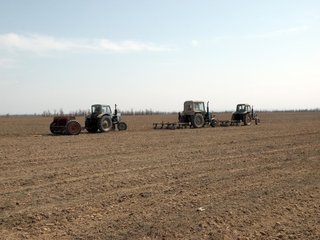
Fallow restoration by no-tillage seeding [Kazakhstan]
Fallow land restoration for fodder production is combined with biodiversity conservation of natural steppe vegetation by no-tillage disc-harrowing and seeding of forage grass in low density.
- ຜູ້ສັງລວມຂໍ້ມູນ:
- Heino Hertel
- First published:
- 2017-05-28 17:21
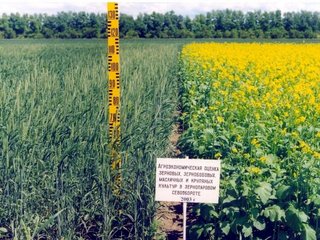
Soil-protective minimal technology of the tillage and sowing [Kazakhstan]
The minimal tillage for cultivation of grain crops (the second and third culture after fallow).
- ຜູ້ສັງລວມຂໍ້ມູນ:
- Ervin Gossen
- First published:
- 2017-05-26 12:05
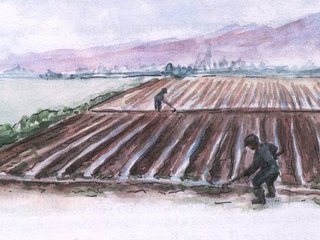
Irrigation using shortened furrows and regulated use of mineral fertilizers [Uzbekistan]
A resource-saving irrigation technology for row crops using shortened furrows, which enables significant savings of irrigation water and improves the efficiency of mineral fertilizer use on irrigated land.
- ຜູ້ສັງລວມຂໍ້ມູນ:
- Oyture Anarbekov
- First published:
- 2017-08-02 23:56
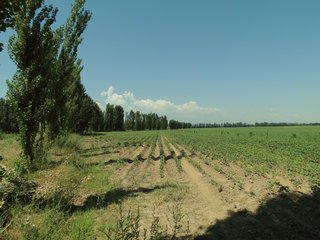
Tree windbreaks within irrigated agriculture in Central Asia [Kyrgyzstan]
Windbreaks of poplar trees (Populus nigra pyramidalis) are a major agroforestry system in irrigated agriculture across Central Asia. Such windbreaks reduce the overall water consumption of irrigated agriculture by 10-20% and increase farm income by 10-15%.
- ຜູ້ສັງລວມຂໍ້ມູນ:
- Niels Thevs
- First published:
- 2021-05-18 14:09
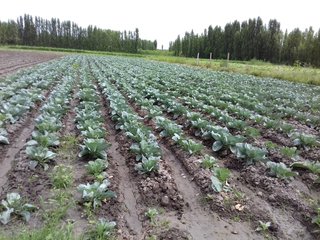
Application of crop rotation in farming conditions [Kyrgyzstan]
Organizing crop rotations as a way to use land efficiently, taking into account the economic interests of landowners and land users, as well as ecological and economic factors.
- ຜູ້ສັງລວມຂໍ້ມູນ:
- Dzhumabaeva Salamatkhan
- First published:
- 2019-09-23 09:21
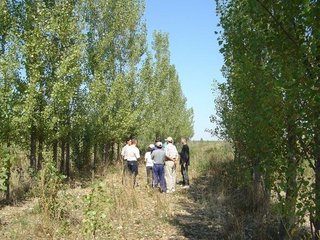
Poplar trees for bio-drainage [Kyrgyzstan]
Poplars planted to lower the ground water table and reduce salinity where irrigation drainage systems have broken down; lucerne cultivated between the tree lines.
- ຜູ້ສັງລວມຂໍ້ມູນ:
- Abdybek Asanaliev
- First published:
- 2017-04-28 10:41
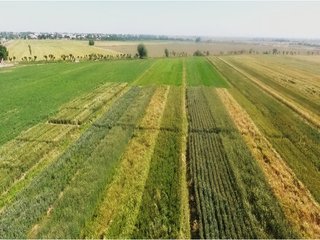
Application of hydrogels for growing agricultural crops under low soil moisture conditions [Uzbekistan]. [Uzbekistan]
The technology of cultivating agricultural crops with the use of hydrogels ensures optimal soil moisture and plant nutrition by accumulating soil water and nutrients and gradually releasing them to the plants, thereby increasing crop yields and improving harvest quality.
- ຜູ້ສັງລວມຂໍ້ມູນ:
- Rustam Ibragimov
- First published:
- 2023-01-23 10:47
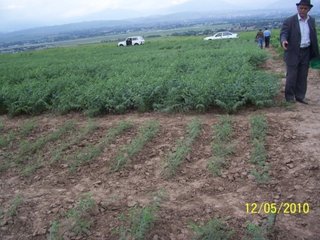
Winter Chickpea Planting in Cold Dry Areas [Uzbekistan]
The use of cold tolerant chickpeas, sown in autumn, significantly benefits farmers by realizing higher profits thanks to smaller amounts of fertilizers required, increased yields, and a better market price.
- ຜູ້ສັງລວມຂໍ້ມູນ:
- Joren Verbist
- First published:
- 2021-09-01 22:28
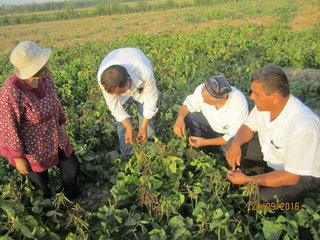
Winter Wheat - Mung Bean Production System [Uzbekistan]
The cultivation of short duration mung bean varieties lead to higher farm-income and improved soil health in Central Asia
- ຜູ້ສັງລວມຂໍ້ມູນ:
- Joren Verbist
- First published:
- 2022-01-26 15:44
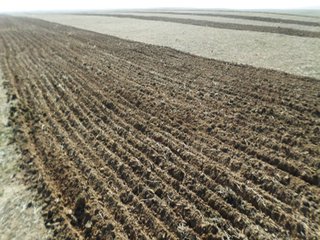
Enriching pastures through phytomelioration [Uzbekistan]
Strip seeding of desert drought-resistant plants on degraded pastures creates an improved and stable structure of pasture phytocoenoses composed of natural and cultivated forage plants, and increases forage potential of desert pastures.
- ຜູ້ສັງລວມຂໍ້ມູນ:
- Rustam Ibragimov
- First published:
- 2023-01-23 10:47
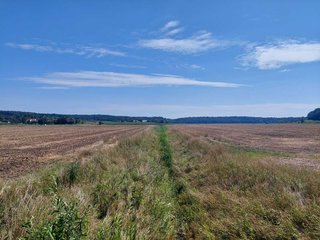
Riparian buffer strips [Slovenia]
Riparian buffer strips are vegetative zones alongside watercourses. In compliance with EU and Slovenia’s Acts, these protective strips reduce soil erosion, filter pollutants, improve water quality, enhance biodiversity and support climate resilience.
- ຜູ້ສັງລວມຂໍ້ມູນ:
- Gregor Kramberger
- First published:
- 2025-07-30 15:41
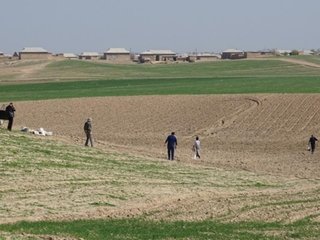
Agroforestry reclamation of rainfed areas [Uzbekistan]
Planting drought-resistant tree species on sloping rainfed areas will increase the productivity of rainfed land and local incomes. Local afforestation of rainfed arable land will provide environmental benefits such as reducing the risk of water erosion, mitigating the impact of climate change by sequestering CO2 in wood biomass and soil, and will also contribute to overall environmental health.
- ຜູ້ສັງລວມຂໍ້ມູນ:
- Rustam Ibragimov
- First published:
- 2023-01-23 10:44
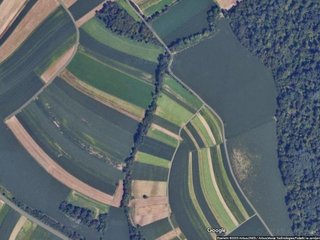
5-Year Crop Rotation [Slovenia]
Crop rotation is good practice in agricultural production. It comprises alternating different types of crops, usually in a specific order. Crop rotation maintains soil fertility, reduces the risk of diseases and pests, and optimizes nutrient utilization. In Slovenia, a 5-year rotation is proving especially effective.
- ຜູ້ສັງລວມຂໍ້ມູນ:
- Gregor Kramberger
- First published:
- 2025-07-30 15:44
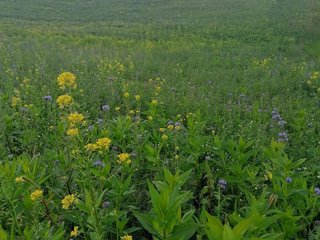
Non-winter-hardy honey-producing cover crops [Slovenia]
Non-winter-hardy honey-producing cover crops enhance soil fertility, prevent erosion, reduce nutrient leaching, and support biodiversity. These fast-growing, flowering plants are integrated into crop rotation, offering ecological and long-term economic benefits - and are supported by EU agricultural subsidies.
- ຜູ້ສັງລວມຂໍ້ມູນ:
- Gregor Kramberger
- First published:
- 2025-07-30 17:04
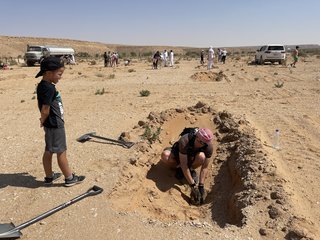
Tree Plantation Pits in Arid Zones [Saudi Arabia]
Tree plantation pits are water harvesting structures which capture rainfall runoff for trees and shrubs. They receive supplementary water until seedlings are well established. Species planted are indigenous, and provide both shade and honey.
- ຜູ້ສັງລວມຂໍ້ມູນ:
- Eric Lacroix
- First published:
- 2024-11-14 15:11
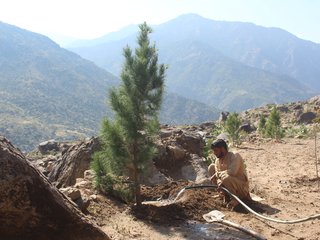
Using lift irrigation for afforestation and agroforestry in Kunar [Afghanistan]
Water exploitation is a major issue in Afghanistan. The lift irrigation technology helps to irrigate an afforestation/agroforestry area (demonstration plot) using surface water (rivers) and solar-powered submersible pump. The construction of reservoirs at the demo plot ensures efficient water storage and use for irrigation purposes without relying on groundwater. A well-designed pipe irrigation scheme is implemented to distribute water evenly across the site, supporting plant irrigation and growth.
- ຜູ້ສັງລວມຂໍ້ມູນ:
- Ahmad Khalid Wiyar
- First published:
- 2025-03-17 08:45
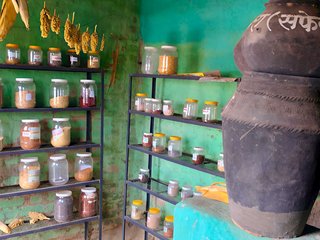
Community seed banks [India]
A community-based seed bank system is a locally managed initiative where farmers and community members collect, store, and share seeds to ensure germplasm and food security, preserve crop diversity, and support sustainable agriculture. These banks are governed by community rules.
- ຜູ້ສັງລວມຂໍ້ມູນ:
- Pratik Ramteke
- First published:
- 2025-06-16 09:27
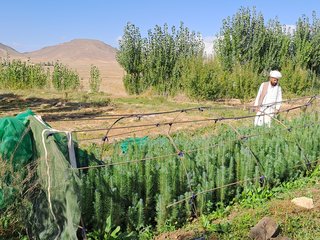
Restoration in the High Conservation Value Forests (HCVF) through community-led initiatives in Paktya [Afghanistan]
An integrated community-led initiative has been established to restore the degraded forests in Paktya province. This initiative focuses on setting up nurseries and incorporates both indigenous and scientific knowledge to cultivate climate-resilient species, such as Cedrus deodara and Pinus gerardiana. These efforts have enhanced the community’s knowledge and skills in sapling production and transplantation, leading to significant improvements in the productivity of these key species, which holds substantial ecological, social, cultural and economic values.
- ຜູ້ສັງລວມຂໍ້ມູນ:
- Mohammad Wazir Ahmadzai
- First published:
- 2025-03-17 08:45
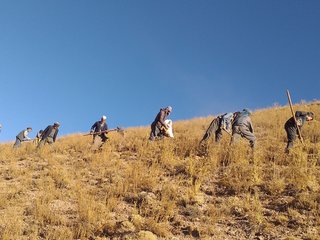
Reseeding local fodder species in Bamyan rangelands using indigenous and scientific methods [Afghanistan]
Artificial reseeding is a key method for restoring degraded rangelands. It involves reintroducing native, palatable fodder species to improve vegetation cover, soil health, and biodiversity. This process boosts forage for grazing animals, stabilizes soil, and helps combat desertification, enhancing ecosystem health and productivity.
- ຜູ້ສັງລວມຂໍ້ມູນ:
- Gul Nabi Khan Noorani
- First published:
- 2025-01-27 08:19
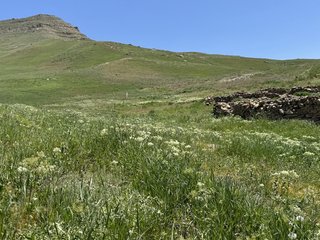
Implementing Site Quarantine to reduce rangeland degradation in the highlands of Badghis [Afghanistan]
Restoring degraded rangelands through quarantine in Qadis district, Badghis Afghanistan.
- ຜູ້ສັງລວມຂໍ້ມູນ:
- Shamsulhaq Shams
- First published:
- 2025-03-23 08:03
- . . .